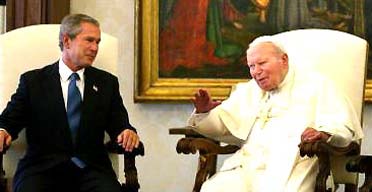Barely audible but with a clear intent, a frail Pope John Paul II today called for the speedy return of Iraqi sovereignty as he met US president George Bush in the Vatican.
The 84-year-old pontiff, an opponent of the US-led war in Iraq, sat alongside the president as he delivered the speech. The two had come from an earlier private meeting where, an aide said, the Pope had "one or two things to say" to Mr Bush about war and peace.
"It is the evident desire of everyone that this situation now be normalised as quickly as possible with the active participation of the international community and, in particular, the United Nations organisation, in order to ensure a speedy return of Iraq's sovereignty, in conditions of security for all its people," the Pope told the president today.
Mr Bush is in Rome at the beginning of a three-day trip to mark the 60th anniversary of the city's liberation. He will also meet Italian prime minister, Silvio Berlusconi, before heading to northern France for the ceremonies to mark the 60th anniversary of the D-day landings.
Mr Bush looked on with respect but impassively as the Pope delivered his speech. He replied with the presentation of the Presidential Medal of Freedom, the US's highest civilian honour, for the Pope's defence of "the unique integrity of every life and all life" and his role in the toppling of totalitarian communism in eastern Europe.
But outside the atmosphere was less harmonious. Thousands of armed police patrolled Rome in anticipation of large numbers of protesters gathering from across Italy to demonstrate against the Iraq war and the Italian government's support for Mr Bush.
Mr Berlusconi said he was "worried about the possible violence" and the US embassy warned Americans to avoid the crowds massed for the protests.
Some anti-war protesters have said they will try and disrupt the visit by blocking roads and attempting to break through barriers erected to protect the presidential entourage.
One group of about 500 protesters marched towards the University of Rome, chanting "George Bush, terrorist!"
"Let's end this stuff about the American liberators," Mario Bucci, a 40-year-old waving a rainbow peace flag, told the Associated Press. "Their credit as liberators was lost in Vietnam."
As Mr Bush arrived at the Vatican, some onlookers behind police cordons applauded while others whistled in disapproval and held up peace banners.
In his speech the Pope said that the recent appointment of a head of state in Iraq and the formation of an interim government were encouraging steps towards a normalisation in that country. But, in a reference to the Abu Ghraib torture scandal, he expressed concern at "deplorable events have come to light which have troubled the civic and religious conscience of all".
He also called for greater efforts to reach a peace deal between Israel and the Palestinians. "May a similar hope for peace also be rekindled in the Holy Land and lead to new negotiations, dictated by a sincere and determined commitment to dialogue, between the government of Israel and the Palestinian Authority," he said.
Speaking with some difficulty in English, the Pope, who has Parkinson's disease, said the threat of international terrorism "remains a source of constant concern".
He cited September 11 2001 as "a dark day in the history of humanity".
In opposing the US-led invasion of Iraq last year, John Paul sent top envoys to both President Bush and the then-Iraqi leader Saddam Hussein and made many public appeals for a diplomatic agreement.
